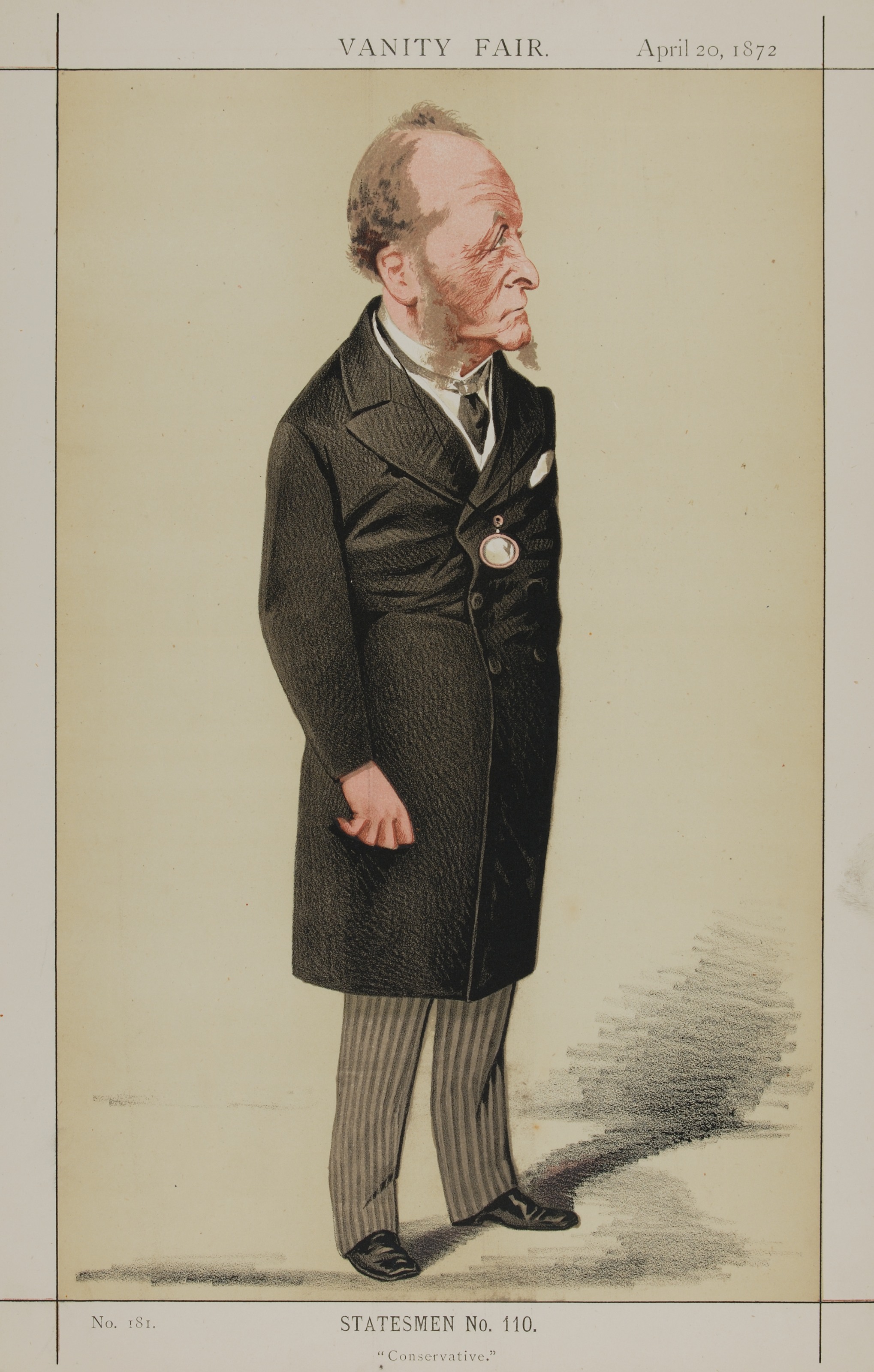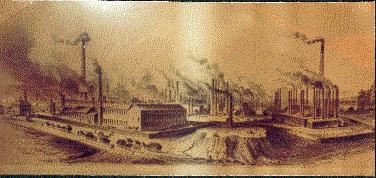|
Gathorne Gathorne-Hardy, 1st Earl Of Cranbrook
Gathorne Gathorne-Hardy, 1st Earl of Cranbrook, (born Gathorne Hardy; 1 October 1814 – 30 October 1906) was a prominent British statesman, Conservative politician and key ally of Benjamin Disraeli. He held cabinet office in every Conservative government between 1858 and 1892 and notably served as Home Secretary from 1867 to 1868 and as Secretary of State for War from 1874 to 1878. Gathorne-Hardy oversaw the British declaration of war for the Second Anglo-Afghan War. Background and education Gathorne Hardy was the third son of John Hardy, of the Manor House Bradford, and Isabel, daughter of Richard Gathorne. His father was a barrister, the main owner of the Low Moor ironworks and also represented Bradford in Parliament; his ancestors had been attorneys and stewards to the Spencer-Stanhope family of Horsforth since the beginning of the 18th century. He was educated at Shrewsbury School and Oriel College, Oxford, and was called to the Bar, Inner Temple, in 1840. He establ ... [...More Info...] [...Related Items...] OR: [Wikipedia] [Google] [Baidu] |
The Right Honourable
''The Right Honourable'' (abbreviation: ''Rt Hon.'' or variations) is an honorific Style (form of address), style traditionally applied to certain persons and collective bodies in the United Kingdom, the former British Empire and the Commonwealth of Nations. The term is predominantly used today as a style associated with the holding of certain senior public offices in the United Kingdom, Canada, New Zealand, and to a lesser extent, Australia. ''Right'' in this context is an adverb meaning 'very' or 'fully'. Grammatically, ''The Right Honourable'' is an adjectival phrase which gives information about a person. As such, it is not considered correct to apply it in direct address, nor to use it on its own as a title in place of a name; but rather it is used in the Grammatical person, third person along with a name or noun to be modified. ''Right'' may be abbreviated to ''Rt'', and ''Honourable'' to ''Hon.'', or both. ''The'' is sometimes dropped in written abbreviated form, but is al ... [...More Info...] [...Related Items...] OR: [Wikipedia] [Google] [Baidu] |
Benenden
Benenden is a village and civil parish in the borough of Tunbridge Wells in Kent, England. The parish is located on the Weald, to the west of Tenterden. In addition to the main village, Iden Green, East End, Dingleden and Standen Street settlements are included in the parish. The parish church is dedicated to St George, and is a 19th-century building on the site of a medieval building destroyed in a fire. Benenden School, a private girls boarding school is located to the north of the village. Origin of name The place name of Benenden (pronounced Ben-en-den) derives from Old English meaning Bynna's wooded pasture. ''Bynning denn'' became Benindene (1086) Binnigdaenne, Bennedene (c1100) Bynindenne (1253) then the current spelling from 1610. History :''A more detailed history can be found in the pdf file as part of a Conservation Appraisal carried out by Tunbridge Wells District in April 2005'' The Wealden iron industry existed in the area from before the Roman period, but e ... [...More Info...] [...Related Items...] OR: [Wikipedia] [Google] [Baidu] |
Horsforth
Horsforth is a town and civil parish within the City of Leeds, in West Yorkshire, England, lying about five miles north-west of Leeds city centre. Historically a village within the West Riding of Yorkshire, it had a population of 18,895 at the 2011 Census. It became part of the City of Leeds metropolitan borough in 1974. In 1999 a civil parish was created for the area, and the parish council voted to rename itself a town council. The area sits within the Horsforth ward of Leeds City Council, which also includes the southern part of Rawdon. History Horsforth was recorded in the ''Domesday Book'' of 1086 as ''Horseford'', ''Horseforde'', ''Hoseforde''; but late-ninth-century coins with the legend ''ORSNA FORD'' and ''OHSNA FORD'' may have come from Horsforth. The name derives from Old English ''hors'' or, to judge from the coins, *''horsa'' ('horse') in the genitive plural form ''horsa''/''horsna'' + ''ford'' ' ford', thus meaning 'horses' ford'. This refers to a river crossi ... [...More Info...] [...Related Items...] OR: [Wikipedia] [Google] [Baidu] |
Spencer-Stanhope Family
Spencer-Stanhope is the family name of British landed gentry who for 200 years held Cannon Hall, a country house in South Yorkshire that since the 1950s has been a museum. The hyphenated form of the name is more common in British orthography, but American sources often omit the hyphen and alphabetize by "Stanhope." 19th century Throughout the 19th and early 20th century, several family members (by birth and marriage) were active in the art world. They were related through John Spencer Stanhope (1787–1873), a classical antiquarian, writer, and explorer, and his wife, Lady Elizabeth, daughter of Thomas Coke of Norfolk, 1st Earl of Leicester. John Spencer Stanhope was the son of industrialist Walter Spencer-Stanhope (1749–1822). The couple died in 1873 within a few days of each other; she on 31 October, he on 7 November. They had six children: * Sir Walter Spencer-Stanhope (1827–1911), Conservative politician. He married Elizabeth Buxton and had 11 children including: ... [...More Info...] [...Related Items...] OR: [Wikipedia] [Google] [Baidu] |
Bradford (UK Parliament Constituency)
Bradford was a parliamentary constituency in Bradford, in the West Riding of Yorkshire. It returned two Members of Parliament (MPs) to the House of Commons of the Parliament of the United Kingdom from 1832 until it was abolished for the 1885 general election. It was then split into three new constituencies: Bradford Central, Bradford East, and Bradford West. Boundaries The constituency was based upon the town of Bradford, in the West Riding of Yorkshire. It was enfranchised as a two-member parliamentary borough from 1832. Before 1832 the area was only represented as part of the county constituency of Yorkshire. After 1832 the non-resident Forty Shilling Freeholders of the area continued to qualify for a county vote (initially in the West Riding of Yorkshire seat, and from 1865 in a division of the West Riding). Bradford, as a new parliamentary borough, had no voters enfranchised under the ancient rights preserved by the Reform Act 1832. All voters qualified under the new u ... [...More Info...] [...Related Items...] OR: [Wikipedia] [Google] [Baidu] |
Low Moor Ironworks
The Low Moor Ironworks was a wrought iron foundry established in 1791 in the village of Low Moor about south of Bradford in Yorkshire, England. The works were built to exploit the high-quality iron ore and low-sulphur coal found in the area. Low Moor made wrought iron products from 1801 until 1957 for export around the world. At one time it was the largest ironworks in Yorkshire, a major complex of mines, piles of coal and ore, kilns, blast furnaces, forges and slag heaps connected by railway lines. The surrounding countryside was littered with waste, and smoke from the furnaces and machinery blackened the sky. Today Low Moor is still industrial, but the pollution has been mostly eliminated. Background The ironworks depended on the excellent resources of high-quality coal and iron ore found in the vicinity. The "better bed" coal came from a seam about thick resting on hard sandstone. This coal is particularly low in sulphur. About above this coal seam there is a layer of "blac ... [...More Info...] [...Related Items...] OR: [Wikipedia] [Google] [Baidu] |
John Hardy (MP For Bradford)
John Hardy (1773 – 29 September 1855) was a British businessman, barrister and Member of Parliament. By marriage to Lady Isabel Gathorne, he was the founder of the Gathorne-Hardy family. Hardy was a barrister, Recorder of Leeds for 27 years and the main owner of the Low Moor ironworks. He represented Bradford in the House of Commons from 1832 to 1837 and from 1841 to 1847. His father, John Hardy (1745-1806), who made successful investments in the Low Moor ironworks, was an attorney at Horsforth and Land Steward to the Spencer-Stanhope family. His father and grandfather had also been Stewards and Clerk to the Stanhope family of Horsforth. Born in Horsforth on the 11th of October 1773, John Hardy was educated in Switzerland near Bienne, where his contemporaries included John Singleton Copley, 1st Baron Lyndhurst and Daniel O'Connell. Hardy lived in Switzerland before returning home for the Bar. He married in 1804 Isabel, daughter and heiress of Richard Gathorne. Their eldest ... [...More Info...] [...Related Items...] OR: [Wikipedia] [Google] [Baidu] |
Second Anglo-Afghan War
The Second Anglo-Afghan War (Dari: جنگ دوم افغان و انگلیس, ps, د افغان-انګرېز دويمه جګړه) was a military conflict fought between the British Raj and the Emirate of Afghanistan from 1878 to 1880, when the latter was ruled by Sher Ali Khan of the Barakzai dynasty, the son of former Emir Dost Mohammad Khan. The war was part of the Great Game between the British and Russian empires. The war was split into two campaigns – the first began in November 1878 with the British invasion of Afghanistan from India. The British were quickly victorious and forced the Amir – Sher Ali Khan to flee. Ali's successor Mohammad Yaqub Khan immediately sued for peace and the Treaty of Gandamak was then signed on 26 May 1879. The British sent an envoy and mission led by Sir Louis Cavagnari to Kabul, but on 3 September this mission was massacred and the conflict was reignited by Ayub Khan which led to the abdication of his brother Yaqub. The second campai ... [...More Info...] [...Related Items...] OR: [Wikipedia] [Google] [Baidu] |
Secretary Of State For War
The Secretary of State for War, commonly called War Secretary, was a secretary of state in the Government of the United Kingdom, which existed from 1794 to 1801 and from 1854 to 1964. The Secretary of State for War headed the War Office and was assisted by a Parliamentary Under-Secretary of State for War, a Parliamentary Private Secretary who was also a Member of Parliament (MP), and a Military Secretary, who was a general. In the nineteenth century the post was twice held by future prime minister Henry Campbell-Bannerman. At the outset of the First World War, prime minister H. H. Asquith was filling the role, but he quickly appointed Lord Kitchener, who became famous while in this position for Lord Kitchener Wants You. He was replaced by David Lloyd George, who went on to become prime minister. Between the World Wars, the post was held by future prime minister Winston Churchill for two years. In the 1960s, John Profumo held this post at the time of the Profumo affai ... [...More Info...] [...Related Items...] OR: [Wikipedia] [Google] [Baidu] |
Gathorne-Hardy Family
Gathorne-Hardy is the name of a British aristocratic family. The first part of the name is pronounced with a long ''a'', i.e. "gay-thorn". The founder of the family was Gathorne Gathorne-Hardy, 1st Earl of Cranbrook. The "eccentric Gathorne-Hardys" as they are sometimes known, have produced many notable members of 19th and 20th century British society. Notable people * Alfred Gathorne-Hardy (18451918), British politician, younger son of the 1st Earl * Lady Anne Gathorne-Hardy (1911-2006), British bookseller and author * Caroline, Countess of Cranbrook, Caroline Gathorne-Hardy, Countess of Cranbrook (born Caroline Jarvis, 1935), British agricultural campaigner, wife of the 5th Earl * Lady Dorothy Gathorne-Hardy (1889-1977), wife of Rupert D'Oyly Carte, founder of the Savoy Hotel * Edward Gathorne-Hardy (19011978), British antiquarian, author and traveller, second son of the 3rd Earl * John Francis Gathorne-Hardy, Francis Gathorne-Hardy (18741949), British general, younger son ... [...More Info...] [...Related Items...] OR: [Wikipedia] [Google] [Baidu] |

_(cropped).jpg)


.jpg)
_WDL11496.png)
_-_The_1st_Viscount_Melville_-_N03880_-_National_Gallery.jpg)